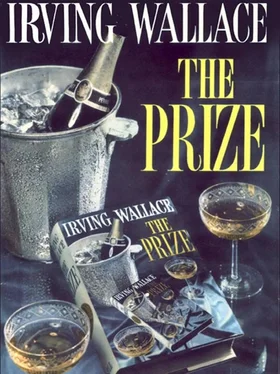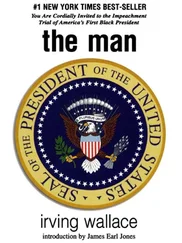He was surprised to see that everyone at the table was rising. With a start, he realized that the Royal Banquet was ended and that the King had departed. With difficulty, he pushed himself to his feet.
‘There’ll be coffee in the salon,’ Ingrid Påhl was saying.
‘Good,’ he said.
He noticed that Leah was engaged in conversation with a diplomat, and had preceded him. He fell in beside Ingrid Påhl and returned to the salon, where a long buffet held the coffee.
His meditations at the table had disturbed him, and now he wanted to avoid formal company and idle talk and to think himself straight in privacy. He was in no mood for Emily now and less in a mood for Leah. He wanted to flee from the rejecters, the embodiments of disapproval.
Nearby, Count Bertil Jacobsson stood momentarily alone, fixing one of his decorations. Craig went to him.
‘Count,’ he said, ‘when you see my sister-in-law, Miss Decker, tell her I left early, I wanted to walk back to the hotel, get some air.’
‘Certainly, Mr. Craig.’ Jacobsson did not hide his concern. ‘Are you all right?’
‘Never better. Memorable evening. Excellent dinner.’
‘You’ll be pleased to know His Majesty was positively delighted with you.’
‘Tell that to my sister-in-law, will you?’ He wanted to add: and tell it to Emily Stratman, too. But he refrained. He said, instead, ‘And by the way, thanks, Count.’
With that, Craig went for his hat and overcoat, and then left the Royal Palace.
He waited on the windswept kerb, in front of the lonely small hotel, for the taxi that he had summoned from the cheap bar inside. A waiter had directed him to dial 22.00.00, and he had, and then given the girl his address and name, and she had said, ‘ Bil kommer ’, which the waiter had told him was good, and now in the cold, he waited for the taxi.
The last time that he had looked, it had been near midnight, and now it must be much later. After leaving the palace, he had walked and walked, not covering much ground in his old man’s walk, staggering sometimes, and leaning against frozen walls of darkened buildings. In the late winter hour, the city had been desolate of life, and without sound except for the heavy clop of his shoes on the pavement and stones and the occasional whirring passage of a motor vehicle. When his nose, mouth, and chin felt numb, almost frostbitten, he had found the gloomily lit hotel in the side street and the empty bar, and for half an hour had defrosted himself with whisky.
For the most part, his brain had been too soggy to entertain logical thought. But an immediate matter had frequently drifted in and out of his head, until, in the bar, he had captured it and made a decision. This night, it seemed, he had reached the nadir of his existence. A glamorous occasion, of which he had been a part as a highly honoured guest, had proved one more of life’s Waterloos. For a moment, in that occasion, he had come alive, felt old stirrings, and because he was no longer armed to be alive, he had failed and sunk back into easier demise. Yet strangely, in all his walking, some persistent fragment of an emotion-infinitesimal but pulsating-survived. The emotion, long dormant, was identifiable: the desire to be loved, not pity-loved, not respect-loved, but simply loved.
When the emotion came clear, he knew what must be done. In sobriety, it would have been madness. Insobriety had a logic all its own. Craig had made his telephone call for the taxi, and now on the kerb, worn and quivering, he waited.
At last, the black sedan with the meter arrived. Craig ducked into its rear seat. For seconds, he searched for his wallet, then located it, and removed the slip of paper that he had found attached to his bottle on the train from Malmö.
‘Drive me to Polhemsgatan 172C,’ he said.
The ride was fast and skidding and of brief duration. He gave the driver a large note, so that he would not have to figure out the kronor, accepted the change, handed over a three-kronor tip, and found himself before a seven-storey apartment building. On the glass door hung a wreath of Christmas lights, disconnected. Craig punched the buzzer, and the door sprang open. He entered.
Above each letterbox, in the hallway wall, was a name, an apartment letter, and a floor number. The fifth from the right read ‘Fröken Lilly Hedqvist, Apt. C., Fl. 6.’
Dizzily groping his way in the faint light, Craig reached the elevator. It was an unusual triangular cage, meant to accommodate two thin Lilliputians, and Craig stuffed himself into its confines as into a foxhole. He squinted at the buttons, hit No. 6, and ground upward to the topmost floor.
When the elevator shuddered to a halt, Craig squirmed out of it. The short, dim corridor swam before his eyes. He wondered if he would make it, or should-the search for love seemed less reasonable now-but suddenly, he knew, this was a better folly than returning to the Grand Hotel and Leah.
With one hand on the wall to support himself, he traversed the corridor. The last apartment door, near the window and fire escape, bore the letter ‘C’. He rapped gently, and when there was no immediate response, he rapped harder.
Her voice came from behind the partition. ‘ Ja? ’
‘It’s I,’ he said.
He heard the lock turn, the door opened partially, and then, at once, it opened fully.
He recognized only the cascade of golden hair. ‘Mr. Craig,’ she whispered with concern, drawing her lavender robe about her.
She swung back and forth before his eyes, like a metronome, and he made one desperate effort at courtliness. He removed his hat, he thought, and said, ‘Miss Lilly-’ and could not remember her last name.
‘Come in, please.’
Her tone was so beseeching that he obeyed at once. His impaired vision could only furnish part of the single room: a mosaic on the wall over a pinewood divan with striped cushions; a glass coffee table on a black tubular frame; two wicker chairs; a small television set; a double bed pulled down from a recess in the wall. Somehow, he reached the bed, and came down on the fat eiderdown.
She was before him, he knew.
He tried to explain. ‘Lilly, I-I’m very drunk-and very old-and don’t care-except-tonight-I wanted to be with someone who would know and not mind-and I thought of you, Lilly. Do you mind?’
She knelt before him. ‘Oh, Mr. Craig. I am happy for me that you came.’
‘I’ll just rest a little and go back to the hotel.’
She took his chilled hands and rubbed them, transmitting her warmth into him. ‘You will stay. I will take care of you. Lie down, lie down and sleep.’
He felt satisfied and welcomed, and then realized that she had taken off his overcoat and jacket and that his head was deep in the feather pillow and that his legs had been lifted on the bed. She was undoing his collar and shirt, he thought, and she was above him, tending him, and perhaps what had brushed his cheek was her breast. It was wonderful to imagine this before sleep, and then, at once, he slept.
He became conscious behind his eyelids, and he waited, motionless, while gradual awakening crept downward through his outstretched body.
When he opened his eyes, he saw the thin drapes, and he saw that the city was still dark behind them. The room in which he lay was partially illuminated by some night lamp out of sight, and from a far corner came the hushed purr of radiator heat. He had expected to find himself in his upstairs bedroom at Miller’s Dam, and then remembered that he was in the Grand Hotel in Stockholm, and then, with increasing bewilderment, he understood that he was in a room unknown to him.
Against the gravity of sleep weight, he sat up with effort, pushing off the blanket. Except for his shorts, he was naked. He had no memory of undressing for bed, when suddenly the last memories of the night flooded into his brain. The image came clear-the cascade of golden hair, the lavender robe-and he swivelled from his sitting position to fill in the rest.
Читать дальше












